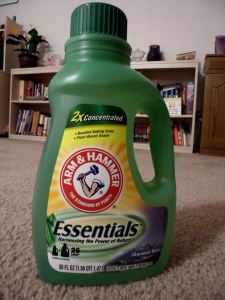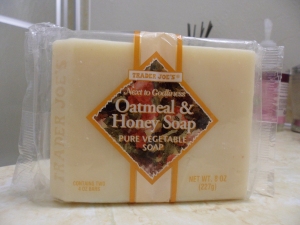Once again, I have discovered the power of baking soda. This time it was by using Arm & Hammer’s Essentials Mountain Rain Laundry Detergent. For years I had been using Eco’s Laundry Detergent (reviewed here) and was thoroughly satisfied with its cleaning ability. However, despite the pleasant scents the product came in, my clothes never retained that scent for more than a day.
For years I had been using Eco’s Laundry Detergent (reviewed here) and was thoroughly satisfied with its cleaning ability. However, despite the pleasant scents the product came in, my clothes never retained that scent for more than a day.
I decided to branch out and consider other products to use. I went to a natural market down the street and considered my options. I was tempted to buy something from Seventh Generation until I spotted this bottle (see photo) from Arm & Hammer.
I am always cautious when considering a product that is labeled “all natural” or “chemical free”, because those terms are not currently regulated by the government. I checked the ingredient label on the bottle. As it turns out, this detergent contains baking soda, coconut-based surfactants, a natural water softener, and water. Hmm, “natural water softener”. What could that be? Salt? That ingredient, whatever it might be, made me a little apprehensive to purchase the product. I then considered the scent, another quality I was looking for. The bottle I grabbed was the “mountain rain” bottle. I unscrewed the cap, took a sniff, and was sold. It is not overpowering, but still smells amazingly good. I decided to give this product a shot and purchased a bottle of it.
I’ve noticed that my clothes now smell like mountain rain after being washed. My whites have actually become whiter too and I attribute that to the baking soda. The $5 (or so) bottle will last over a month, too, so it’s not overpriced.
Overall, I am pretty thrilled about this product. Who knows, maybe in a few years I will find something else that I like better, but for now I love it and would love to find other products with the same scent.
Review: Trader Joe’s Oatmeal & Honey Soap
June 5, 2011
 While there is no short supply of eco- and people-friendly soaps on the market, I felt it necessary to post about this particular brand. First and foremost, it ranks as one of the lesser expensive brands (~$1.50-$2.00/2 bars). In fact, I don’t ever recall finding anything that costs less. For some that isn’t such a large issue, but for a college student it is.
While there is no short supply of eco- and people-friendly soaps on the market, I felt it necessary to post about this particular brand. First and foremost, it ranks as one of the lesser expensive brands (~$1.50-$2.00/2 bars). In fact, I don’t ever recall finding anything that costs less. For some that isn’t such a large issue, but for a college student it is.
To begin with, this soap smells wonderful. It is not overpowering, but still strong enough to leave you and your bathroom smelling good. It is also very gentle on skin. I have pretty sensitive (and dry) skin and this soap doesn’t irritate my skin or leave it feeling dry. Each bar lasts about 2-3 weeks and lathers easily.
I should warn you, however, that you might unintentionally make friends with a bee or two when using this soap. I noticed soon after I started using it that bees seemed to like buzzing around me more than usual. Obviously it’s the honey that’s attracting them, but I wouldn’t be too worried about it.
Trader Joe’s also makes another soap with tea tree oil, but I have yet to try it out. Has anyone tried this soap before? If so, comment and let me know what you thought of it. I’ve considered trying it out, just never have.
The Versatility of Vinegar
October 10, 2010
Like baking soda, vinegar has many uses. The great thing about choosing vinegar over conventional products is it is eco- and human-friendly. The following is a list of ways in which I’ve learned to use vinegar. To find additional ideas, check out this website.
The water where I live is very hard so I am constantly fighting scale build-up. To combat this, I use a small brush and vinegar to remove the scale. I’ve learned through trial and error that scale should be dealt with early on and not later once it has built up to ridiculous proportions. The low pH of the vinegar aids in dissolving the scale, and the brush helps to loosen and remove the particles. Be sure to make note of what the surface you are trying to clean is made out of. The “granite” (it’s really more like a schist) counter-tops in my kitchen and bathroom have a seal that can be easily removed by vinegar, so I cannot use vinegar to clean them.
Vinegar and water combined in a 1:1 ratio will create a nice all-purpose cleaner. This cleaner can be used to clean up messes, clean windows and mirrors, and sanitize surfaces. It can even be used in conjunction with baking soda to sanitize your toilet bowl when cleaning it.
Vinegar also works well as a rinse agent in the dishwasher by helping to remove water spots.
My most favorite use of vinegar is in unclogging drains. By sprinkling a little baking soda and vinegar down a drain, then stopping it with a rag, and pouring boiling water down the drain 15 minutes later, you can unclog your drain. This has failed once in the dozen or so times I have tried it.
Happy cleaning 🙂
Choosing the Right Sunscreen
August 29, 2010
Do you use sun protection? Hopefully you do. Do you put it on only when you plan to be outside for an extended amount of time, or do you wear it everyday? I used to wear mine everyday. I currently use a moisturizer with a built-in SPF of 15, but I no longer have a body moisturizer that has an SPF in it. You see, when I switched my lotion for a greener alternative, I couldn’t find one that met my standards that also provides sun protection. The one I am currently using on my face is nowhere near green, but I refuse to throw it out because it’s a waste of product and money. I realize that I need to start using sun protection again, but I also realize that a lot of products which claim to block both UVA and UVB rays don’t do such a great job, or they only block UVB but not UVA.
Searching for the right sunscreen can be a daunting task. Looking for eco- and human-friendly products can be difficult, but add that to finding a sunscreen which will actually protect your skin, and you’ve got quite a challenge. Fortunately, there are available resources online that can help you out. I don’t recall having read anything in either green living book that I own (Snow and Loux), but I know that the Environmental Working Group (EWG) has conducted several studies on popular sunscreens and their findings are pretty frightening.
The EWG’s 2010 Sunscreen Guide offers a list of sunscreens to avoid (and why), some of the best sunscreens to buy (and why), as well as sun safety tips. Did you know that, according to the EWG, some sunscreens not only fail in providing protection from UVA rays (which can cause skin cancer), but they also come in sprays or powders that can be accidentally inhaled? Some of the particles in those sprays and powders can cause lung damage and/or enter the bloodstream and potentially cause cancer. Wow.

